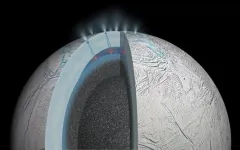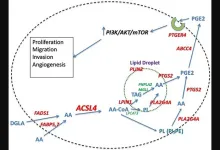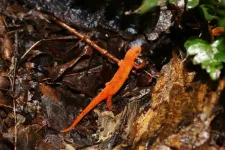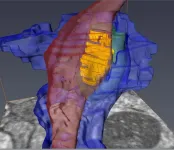(Press-News.org) An international team including a University of Washington scientist has found that the water on one of Saturn’s moons harbors phosphates, a key building block of life. The team led by the Freie Universität Berlin used data from NASA’s Cassini space mission to detect phosphates in particles ejected from the ice-covered global ocean of Saturn’s moon Enceladus.
Phosphorus, in the form of phosphates, is vital for all life on Earth. It forms the backbone of DNA and is part of cell membranes and bones. The new study, published June 14 in Nature, is the first to report direct evidence of phosphorus on an extraterrestrial ocean world.
The team found that phosphate is present in Enceladus’ ocean at levels at least 100 times higher — and perhaps a thousand times higher — than in Earth’s oceans.
“By determining such high phosphate concentrations readily available in Enceladus’ ocean, we have now satisfied what is generally considered one of the strictest requirements in establishing whether celestial bodies are habitable,” said third author Fabian Klenner, a UW postdoctoral researcher in Earth and space sciences. While at Freie Universität Berlin, Klenner did experiments that revealed the high phosphate concentrations present in Enceladus’ ocean.
One of the most profound discoveries in planetary science over the past 25 years is that worlds with oceans beneath a surface layer of ice are common in our solar system. These ice-covered celestial bodies include the icy moons of Jupiter and Saturn — including Ganymede, Titan and Enceladus — as well as even more distant celestial bodies, like Pluto.
NASA’s Cassini mission explored Saturn, its rings and its moons from 2004 to 2017. It first discovered that Enceladus’ harbors an ice-covered watery ocean, and analyzed material that erupted through cracks in the region of the moon’s south pole.
The spacecraft was equipped with the Cosmic Dust Analyzer. which analyzed individual ice grains emitted from Enceladus and sent those measurements back to Earth. To determine the chemical composition of the grains, Klenner used a specialized setup in Berlin that mimicked the data generated by an ice grain hitting the instrument. He tried different chemical compositions and concentrations for his samples to try to match the unknown signatures in the spacecraft’s observations.
“I prepared different phosphate solutions, and did the measurements, and we hit the bullseye. This was in perfect match with the data from space,” Klenner said. “This is the first finding of phosphorus on an extraterrestrial ocean world.”
Planets with surface oceans, like Earth, must reside within a narrow range of distances from their host stars (in what is known as the “habitable zone”) to maintain temperatures at which water neither evaporates nor freezes. Worlds with an interior ocean like Enceladus, however, can occur over a much wider range of distances, greatly expanding the number of habitable worlds likely to exist across the galaxy.
In previous studies, the team at the Freie Universität Berlin determined that Enceladus harbors a “soda ocean,” rich in dissolved carbonates, that also contains a vast variety of reactive and sometimes complex carbon-containing compounds. The team also found indications of hydrothermal environments on the seafloor. The new study now shows the unmistakable signatures of dissolved phosphates.
“Previous geochemical models were divided on the question of whether Enceladus’ ocean contains significant quantities of phosphates at all,” said lead author Frank Postberg at Freie Universität Berlin. “These measurements leave no doubt that substantial quantities of this essential substance are present in the ocean water.”
To investigate how the ocean on Enceladus can maintain such high concentrations of phosphate, geochemical lab experiments and modeling included in the new paper were conducted by a Japan-based team led by second author Yasuhito Sekine at the Tokyo Institute of Technology and a U.S.-based team led by fourth author Christopher Glein at the Southwest Research Institute in San Antonio, Texas. Other authors are from Germany, the U.S., Japan and Finland.
###
For more information, contact Klenner at fklenner@uw.edu and Postberg at frank.postberg@fu-berlin.de.
END
URBANA, Ill. — Conflict is unavoidable in all marriages. When it erupts in families with children, stressed or angry parents may take their pain out on the kids, projecting their anger or withdrawing emotionally or physically. In the worst cases, children’s socioemotional development can suffer. But the way parents, especially fathers, deal with marital conflict can make a difference to kids, according to a new study from researchers at the University of Illinois Urbana-Champaign.
“In the past, marital conflict ...
CHICAGO, June 14, 2023 -- Leaders in health equity have issued an urgent call to address the underrepresentation of U.S. Latinos in Alzheimer's and dementia clinical trials. Their recommendations are outlined in an article published online today by Alzheimer's & Dementia: Translational Research & Clinical Interventions.
“A call to address structural barriers to the representation of Hispanics/Latinos in clinical trials on Alzheimer's disease and related dementias: A micro-meso-macro perspective,” was led by first author María P. Aranda, ...
National economies recover significantly faster from shocks when countries are powered by renewable energy sources, according to new research that has profound implications for global energy policy.
Researchers from Trinity College Dublin looked for patterns in data from 133 systemic economic crises that affected 98 countries over a 40-year span. And while their analyses show that countries relying on a broader range of energy sources experience longer recovery times, the best predictor of economic recovery was the extent to which a country relied on renewable energy.
Underlining the significance of the finding is the fact that while data ...
From protecting biodiversity to ensuring the safety of drinking water, the biochemical makeup of rivers and streams around the United States is critical for human and environmental welfare. Studies have found that human activity and urbanization are driving salinization (increased salt content) of freshwater sources across the country. In excess, salinity can make water undrinkable, increase the cost of treating water, and harm freshwater fish and wildlife.
Along with the rise in salinity has also been an increase in alkalinity over time, and past research suggests that salinization may enhance alkalinization. But unlike excess salinity, ...
MINNEAPOLIS – People with inflammatory bowel disease (IBD) are more likely to have a stroke than people without the disease, according to a study published in the June 14, 2023, online issue of Neurology®, the medical journal of the American Academy of Neurology. The study does not prove that IBD causes stroke; it only shows an association.
Inflammatory bowel disease causes chronic inflammation of the intestines. It includes Crohn’s disease, ulcerative colitis and unclassified inflammatory bowel disease.
The study found that people with IBD were 13% more likely to have a stroke up to ...
For years, research and therapies for allergic asthma have been focused largely on targeting the inflammatory cytokines in the body that react to allergens and cause overproduction of mucus, wheezing and difficulty breathing. Commonly prescribed drugs like Omalizumab, Dupilumab, Mepolizumab and Reslizumab lower or block the various cytokines and antibodies responsible for the asthmatic response, but they work after a patient’s airway inflammation is well underway.
Dr. Tigno-Aranjuez wanted to ...
“ACSL4 has been demonstrated to play a pivotal role in both normal physiology as well as in a variety of disease states, including breast and other cancers.”
BUFFALO, NY- June 14, 2023 – A new review paper was published in Oncotarget's Volume 14 on June 12, 2023, entitled, “ACSL4: biomarker, mediator and target in quadruple negative breast cancer.”
Breast cancer is a heterogeneous disease for which effective treatment depends on correct categorization of its molecular subtype. ...
New research indicates the fungal pathogen Batrachochytrium salamandrivorans (Bsal) could be devastating to amphibian biodiversity if introduced to North America. Nature Communications published the findings June 5 from a group of researchers at the University of Tennessee Institute of Agriculture, the University of Massachusetts-Boston and Washington State University.
“We could see over 80 species of salamanders in the United States and 140 species in North America experience population declines if Bsal is introduced,” said Matt Gray, the lead author and professor of ...
Scientists have created one of the most detailed 3D images of the synapse, the important juncture where neurons communicate with each other through an exchange of chemical signals. These nanometer scale models will help scientists better understand and study neurodegenerative diseases such as Huntington’s disease and schizophrenia.
The new study appears in the journal PNAS and was authored by a team led by Steve Goldman, MD, PhD, co-director of the Center for Translational Neuromedicine at the University of Rochester and the University of Copenhagen. The findings represent a significant technical achievement ...
ORLANDO, June 14, 2023 — The number of older adults in the U.S. population is growing, expecting to nearly double by 2060, and becoming more diverse with racial and ethnic minority populations projected to increase by 105% by 2040.
“As a society, we’re not ready for that,” says Norma Conner, a professor in the University of Central Florida’s College of Nursing. “We need to be cognizant of the large population of older adults that is going to be ours to care for, and we need to have a better understanding that reflects them.”
To ...






